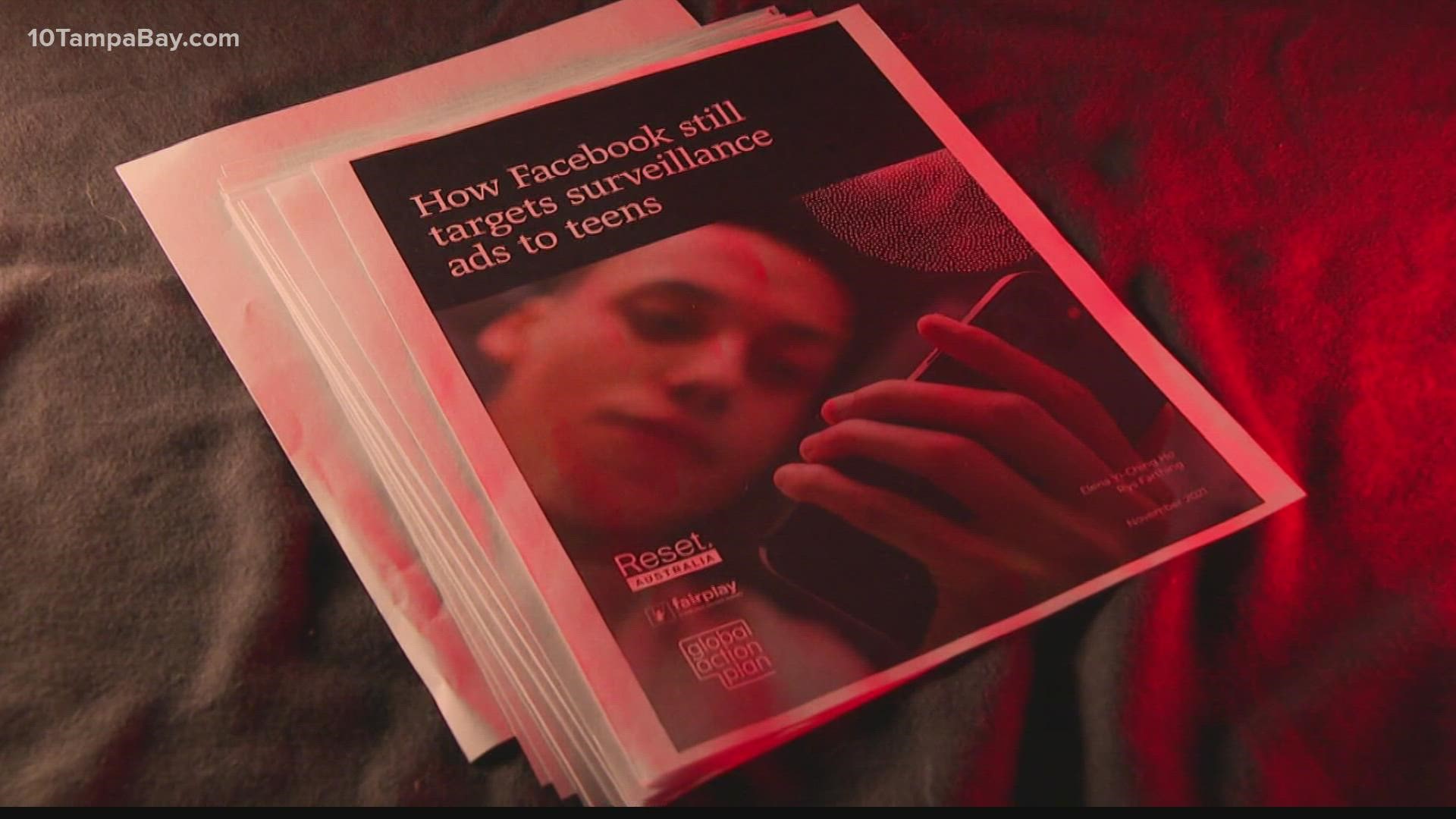ST. PETERSBURG, Fla. — A new report claims Facebook and its parent company, Meta, are still collecting and harvesting your kids’ data — from what they like, to what they search — to target them with ads.
Fairplay, Reset Australia and Global Action Plan released the report. They say it is proof that despite promises from Facebook over the summer that it would stop surveillance ads, they continue and are being optimized by artificial intelligence, or AI, data systems.
Facebook has become one of the main drivers of how the world connects. It’s not just for adults. Kids as young as 13 can register accounts. They are simple enough to create but come with a complicated responsibility.
“Facebook's own research says now the bullying follows children home. It goes into their bedrooms," France Haugen testified earlier this year.
Haugen is the former Facebook employee who sounded the alarm last month saying that the company prioritizes profit over safety. The company has firmly denied that.
“Facebook is continuing to collect sensitive information from young people and use it to target them with ads,” David Monahan said.
Monahan works for Fairplay, which is among a coalition of groups that advocate for children’s privacy, especially online.
In addition to the report, Fairplay and dozens of other organizations sent a demand letter to Meta calling on the company to reveal the full detail of how teens receive “optimized, targeted ads” and to end the practice altogether. They say the practice of surveillance advertising allows businesses to profit but can be harmful to children who he says can’t always see how they’ve been targeted for a product or service.
“The losers are young people and families,” he said.
In July, Meta (then known as Facebook) said on all platforms it would only let advertisers target kids using their age, gender and location, putting an end to targeting options such as interests or their activity on other apps and websites.
From the report, "How Facebook still targets surveillance ads to teens," researchers say they created three clean accounts. One was registered to a 13-year-old user and two other accounts for 16-year-olds. They say they found evidence on all three accounts that Facebook collected browsing data and that could be used to harvest more information to be given to advertisers.
A Meta spokesperson says they haven’t seen the report and explained to us the findings are flawed.
“We haven’t seen the report, but it’s wrong to say that because we show data in our transparency tools it’s automatically used for ads. We don’t use data from our advertisers' and partners' websites and apps to personalize ads to people under 18. The reason this information shows up in our transparency tools is because teens visit sites or apps that use our business tools. We want to provide transparency into the data we receive, even if it's not used for ads personalization," Meta spokesperson Joe Osborne said.
U.S. Rep. Kathy Castor, D-Tampa, doesn’t buy it and says these companies need to protect children from surveillance advertisements.
“Despite Facebook saying that they’re changing things they’re really not. We know that based on this latest report,” Castor said. She has introduced the Kids PRIVCY Act.
The legislation aims to give parents and children more privacy protections on all platforms. It also includes a ban on surveillance advertising to users younger than 18.
She offered this to parents when thinking about businesses using a child’s browsing history to target them.
“A search, maybe a very personal search on mental health issues or other health issues. It’s totally out of bounds for advertisers then to fill their iPad and iPhone and the computer at home with ads that could have really harsh consequences for them,” she said.
Castor says the practice of companies, who are strangers, watching our kids online and using that needs regulation.
“You would probably call the police if someone was tracking your child in that way and that’s what is happening online today,” she said.
On Tuesday, Castor received a response from the Federal Trade Commission in response to her letter to them in October regarding plans by several companies to align with the United Kingdom’s Age appropriate design code. That, says Castor, provides much more protection and oversight for children online and their privacy.
Lina Khan who leads the FTC wrote, in part: “The FTC will monitor the promises companies make regarding their practices and the steps they take to protect younger users online, including teens. The FTC will also use its legal authority under Section 5 of the FTC Act to hold to account businesses that engage in 'unfair or deceptive acts or practices,' including those firms that fail to adhere to public commitments made regarding children’s and teen’s privacy.”

